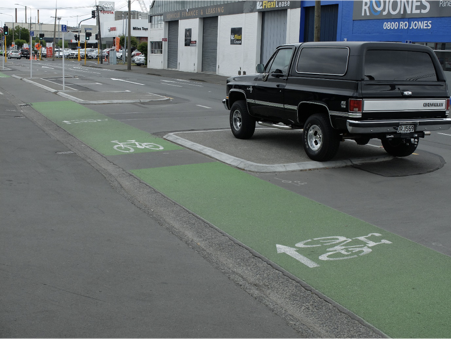Toward Vision Zero in Christchurch
Perceptions of safety are a serious barrier to people taking up cycling. Vision Zero is an approach to road safety that has, as its aim, zero fatalities or serious injuries.
CAN and Living Streets Aotearoa together endorsed Vision Zero at the 2 Walk and Cycle Conference in mid-2016, and local councils and community boards are beginning to pick up the idea.
Halswell Residents Association (Inc.), of which I am Secretary, approached our Community Board in Christchurch in November 2016 seeking their endorsement. Despite reluctance from City Council staff, Community Board referred us to City Council’s Infrastructure, Transport and Environment Committee in December 2017. They have requested a workshop in early 2018, following which we hope that there will be a recommendation to the full Council for adoption and implementation.

Enforcement and education are fundamental components of Vision Zero. This vehicle has been parked in such a way that vehicles crossing the cycleway cannot see people on bikes (St Asaph Street cycleway, Christchurch, November 2017).
A core principle of Vision Zero is that “it can never be ethically acceptable that people are killed or seriously injured when moving within the road transport system”, for example as explained here https://www.monash.edu/muarc/research/our-publications/papers/visionzero. Although much of the publicity around Vision Zero has been on the safety of the infrastructure, Vision Zero also includes a strong role for both enforcement and education and it was this combination that convinced our residents association. We are concerned about road safety in our community, because of its link to community liveability and wellbeing through the reluctance of people to walk or bike.
NZTA uses an approach called Safe Systems, which nominally combines infrastructure, education and enforcement – just like Vision Zero. This similarity was highlighted by Council staff in their objections to endorsing Vision Zero. Our response was (1) that NZTA’s implementation focuses on infrastructure and largely ignores education and enforcement; (2) that City Council likewise focuses on infrastructure; and (3) that there is a fundamental philosophical difference between Vision Zero and Safe Systems.
In terms of enforcement, one example we gave was the essentially complete absence of red light cameras in Christchurch. Although (for example) enforcing speed limits and the wearing of seat belts is the responsibility of NZ Police, it is local councils that run the traffic signal system. Similarly, “no parking” zones are usually set up with safety in mind and (again), it is councils that adopt and enforce parking restrictions.
The fundamental philosophical difference between Vision Zero and Safe Systems is that of outcomes versus inputs. Vision Zero states the desired outcome (no fatalities or serious injuries), whereas Safe Systems assumes that if infrastructure design, and enforcement and education are all done, then road safety will inevitably follow. Consequently, Vision Zero always focuses on the outcome and gives room for innovation to find ways to meet this outcome. This space for innovation is much less present in Safe Systems, and we can see this in the present hand-wringing over the year-on-year increase in road deaths.
As I write this, Waitemata Local Board in Auckland, and Hamilton City Council have both endorsed Vision Zero. If Christchurch City Council likewise endorses Vision Zero, we envisage playing a much more active role in identifying ways in which the liveability of our community can be increased through a new approach to road safety. Examples might include:
- Engaging with a local community about driving habits in a contested space such as supermarket entrances and exits;
- Monitoring compliance with traffic signals, with subsequent enforcement and community engagement.
David Hawke
David Hawke has worked in the past for Spokes Canterbury and as Secretary of CAN. David is Secretary of Halswell Residents Group (Inc.) in Christchurch.
The attachments you can download and read below are:
- The text of Halswell Residents Association’s initial approach to Halswell – Hornby – Riccarton Community Board (November 2016)
- The response of Christchurch City Council staff to our delegation (February 2017)
- Our rebuttal of the staff response (June 2017)
Links to other information on Vison Zero, that we have found useful:
- The CAN position on Vision Zero is here https://can.org.nz/call-for-vision-zero
- There are many good promotional videos Two example are here https://www.youtube.com/watch?v=E9sImnOIS3M and here https://www.youtube.com/watch?v=bsyvrkEjoXI
| Attachment | Size |
|---|---|
| 249.68 KB | |
| 595.82 KB | |
| 588.22 KB |
